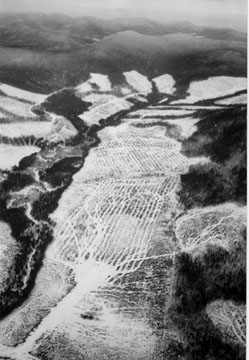 |
|
 |
|
 Failure is not a word that is in the Forest Ecology Network's vocabulary. What can one say when the multinational paper corporations spend millions of dollars on a disinformation campaign to defeat Question 2? They bought the election. It is a hollow victory since the paper corporations know the people of Maine want sustainable forestry, the elimination of clearcuts, and the end of toxic herbicide spraying. They also know we will continue to fight for forest protection, restoration, and preservation. The 175,000 voters who could see through the lies, distortions, and fear tactics, are a solid base from which to persistently apply pressure for reform. As activists we get more than our fair share of criticism. However, as activists, we are not looking for praise, but forest policy reform. We do learn from our mistakes as well as our accomplishments. No great change in behavior or ways of thinking have ever occurred without the persistent efforts of those who are willing to challenge the status quo and to endure the anger and the ridicule of those who want to block reform. The anti-slavery, suffrage, labor, and civil rights movements all succeeded in the face of opposition because they were willing to stay the course. We will not back down or give up! The recent listing of the Atlantic Salmon as endangered, over the objections of the Governor, the paper corporations, the blueberry industry, and aquaculture interests, is a good example of where persistence paid off. While the Forest Ecology Network was a party to the lawsuit which resulted in the listing, it was seven years of "never give up" work by activists like Dave Carle of the Conservation Action Project which caused the federal government to abandon the "do nothing" state conservation plan and enforce the laws of the Endangered Species Act. Recently, I reread the "Paper Plantation" by John Osborne and Ralph Nader. It was written over 25 years ago, and yet the message still rings loud and clear. We are up against a paper corporation octopus whose tentacles surround the Maine Forest Service, the state legislature, the Sportsman's Alliance of Maine, and even some environmental groups like Maine Audubon. Following the paper corporations' money trail can lead to some rather anti- democratic observations. If we want democracy, the real issue is not subverting the referendum process to make it harder for citizens to participate, but the elimination of the open checkbook from large corporate entities and the like. Free speech is essential in an open society. Unfortunately, speech is not free. It costs a lot of money. And yet, we have the Governor and the paper corporations colluding once again to try to alter the citizen initiative process. No matter what the issue, the citizens need to have the right to redress their grievances through an open public debate and vote. The referendum process is the cornerstone of participatory democracy. The referendum process, win or loose, is an important vehicle for widespread public education. The Forest Ecology Network's efforts over the last four years have been a driving force behind making the protection of the Maine Woods a central environmental issue. The forests of Maine, while still being degraded by industrial forestry as usual (clearcuts, overcuts, plantations, and toxic spraying), would be far worse off in the absence of our efforts. Indeed, The Nature Conservancy purchase of 185,000 acres in the Upper St. John River valley, the 50 million dollar state Land Bond, and several development easement proposals (Pingree and West Branch Project) have been fueled by our dogged public exposure of the destruction taking place in the Maine Woods.  The ball is in the paper corporations' court. If they want to continue this battle over reform in the public arena, then they need only to carry out business as usual. If they are seriously interested in addressing the rightful concerns of the people of Maine on how the forests are being managed, then they must abandon their current "greenwash" strategy of a spin doctor PR campaign. There are workable solutions to the crisis in the Maine Woods. We are, and have always been, more than willing to sit down and talk about substantive on the ground forest practice changes. We are not willing to sit idly by as the forests are depleted, biodiversity compromised, soils eroded, streams and lakes contaminated, and forest related jobs lost. We still have a long way to go toward the visions of sustainable low impact forestry and wilderness restoration. Change takes time. Unless seeds are sown, there will be no forest. As every forest ecologist knows the forces opposing seed germination, seedling development, and substantive future growth are enormous. Forest growth and maturation is a precarious business. I believe our efforts have planted the seeds of change. Ideas have germinated and taken root. We will prevail, but we must remain focused and vigilant if we are to have a healthy sustainable forest for the future. |
next page
283 Water Street, 3rd floor, P.O. Box 2118, Augusta, Maine 04338 phone: 207-628-6404 fax - 207-628-5741 email: fen@powerlink.net